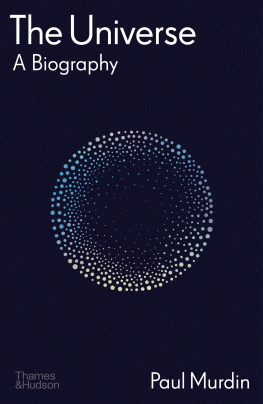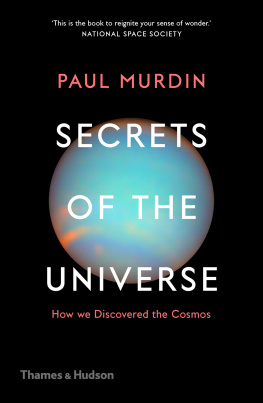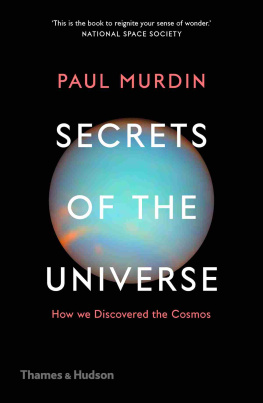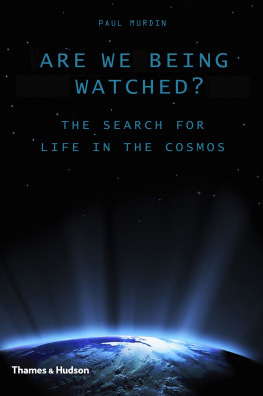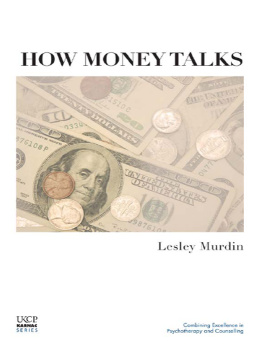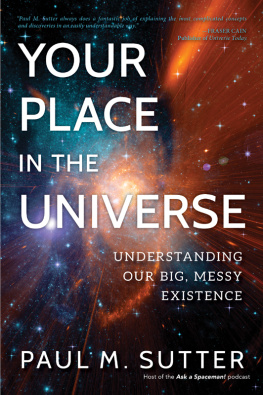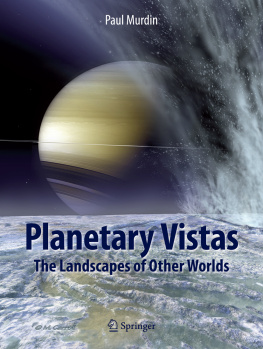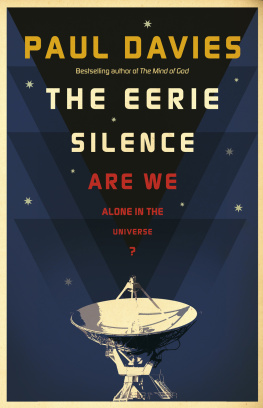Paul Murdin - The Universe: A Biography
Here you can read online Paul Murdin - The Universe: A Biography full text of the book (entire story) in english for free. Download pdf and epub, get meaning, cover and reviews about this ebook. year: 2022, publisher: Thames & Hudson, genre: Religion. Description of the work, (preface) as well as reviews are available. Best literature library LitArk.com created for fans of good reading and offers a wide selection of genres:
Romance novel
Science fiction
Adventure
Detective
Science
History
Home and family
Prose
Art
Politics
Computer
Non-fiction
Religion
Business
Children
Humor
Choose a favorite category and find really read worthwhile books. Enjoy immersion in the world of imagination, feel the emotions of the characters or learn something new for yourself, make an fascinating discovery.
- Book:The Universe: A Biography
- Author:
- Publisher:Thames & Hudson
- Genre:
- Year:2022
- Rating:5 / 5
- Favourites:Add to favourites
- Your mark:
- 100
- 1
- 2
- 3
- 4
- 5
The Universe: A Biography: summary, description and annotation
We offer to read an annotation, description, summary or preface (depends on what the author of the book "The Universe: A Biography" wrote himself). If you haven't found the necessary information about the book — write in the comments, we will try to find it.
Paul Murdin: author's other books
Who wrote The Universe: A Biography? Find out the surname, the name of the author of the book and a list of all author's works by series.
The Universe: A Biography — read online for free the complete book (whole text) full work
Below is the text of the book, divided by pages. System saving the place of the last page read, allows you to conveniently read the book "The Universe: A Biography" online for free, without having to search again every time where you left off. Put a bookmark, and you can go to the page where you finished reading at any time.
Font size:
Interval:
Bookmark:



Paul Murdin is Senior Fellow at the University of Cambridges Institute of Astronomy and a member of Wolfson College. From 1963 he was a research scientist studying supernovae, black holes and neutron stars. He is identified as the co-discoverer of the first stellar black hole found in our Galaxy, Cygnus X-. From 1981 he worked to organize observatories in the Canary Islands, England and Scotland, becoming a science policy maker for the UK government. In 1988 he was awarded an OBE and in 2011 he received the Royal Astronomical Societys Award for Services to Astronomy. In a parallel career he has been, and remains, a broadcaster and commentator about astronomy for the BBC and other media outlets. He is the author of many books, including Secrets of the Universe and The Secret Lives of Planets.
Thames & Hudson include:
Are We Being Watched?
Paul Murdin
What Shape is Space?
Giles Sparrow
Be the first to know about our new releases,
exclusive content and author events by visiting
www.thamesandhudson.com
www.thamesandhudsonusa.com
www.thamesandhudson.com.au

From the birth of the Universe as exotic fundamental particles, its biography continues as matter and dark matter in a dance of stars and galaxies, gathered into clusters.
The word astronomy can mean both the activity through which astronomers discover what happens in the Universe and the science itself, in which the discoveries are described. A history of astronomy is usually a narrative about the first the way that the science of astronomy developed throughout human history, from early times to the present. Although some of this history is recounted here, this book is primarily the story of the Universe its birth and its growth even if, as with the life of a historical figure, some chapters of its biography are obscure or missing.
The book paints a picture of what has happened in the Universe, starting from its beginning in the first milliseconds of the Big Bang expansion. In the Prequel () some of the events that are likely to happen in the future.
Like biographies in general, this one is broadly chronological, although sometimes it has made more sense to describe what happened in overlapping sequences I have sought to write an understandable story rather than one that is strictly chronological. A time marker at the top of each right-hand page locates when the events described in the text of that sub-section took place.
Astronomy is, in its essence, the science of the very large, even though small interactions in its tiniest components molecules, atoms and subatomic particles cause its most dramatic events. As a result, despite it being the weakest of the forces, gravity plays more of a role in astronomy than in other sciences because it has great effects on large masses, like planets, stars and galaxies, even if they are separated by large distances. The Earth and the minor bodies of the solar system, such as meteorites, are the smallest astronomical bodies that I consider.
This is my selection of what I believe are the most important events, the greatest structures, the most powerful explosions, the largest ecosystems and the celestial bodies in the life of the Universe that are most relevant to our human story.
There are lots of billions in this book billions of stars, billions of galaxies, billions of light years, and more. The word is formally not used in science, but in this book billion is equivalent to 1,000 million.
The Universe was born about 13.8 billion years ago. If it had not been born, and if, therefore, it has existed for ever, this book could not have been written as a biography. There would have been no progression or development of the Universe over time and everything would always remain the same. But, gazing into the far distances of space, astronomers can see changes laid out in a timeline and this book is an attempt to put what they see into words, like a biography.
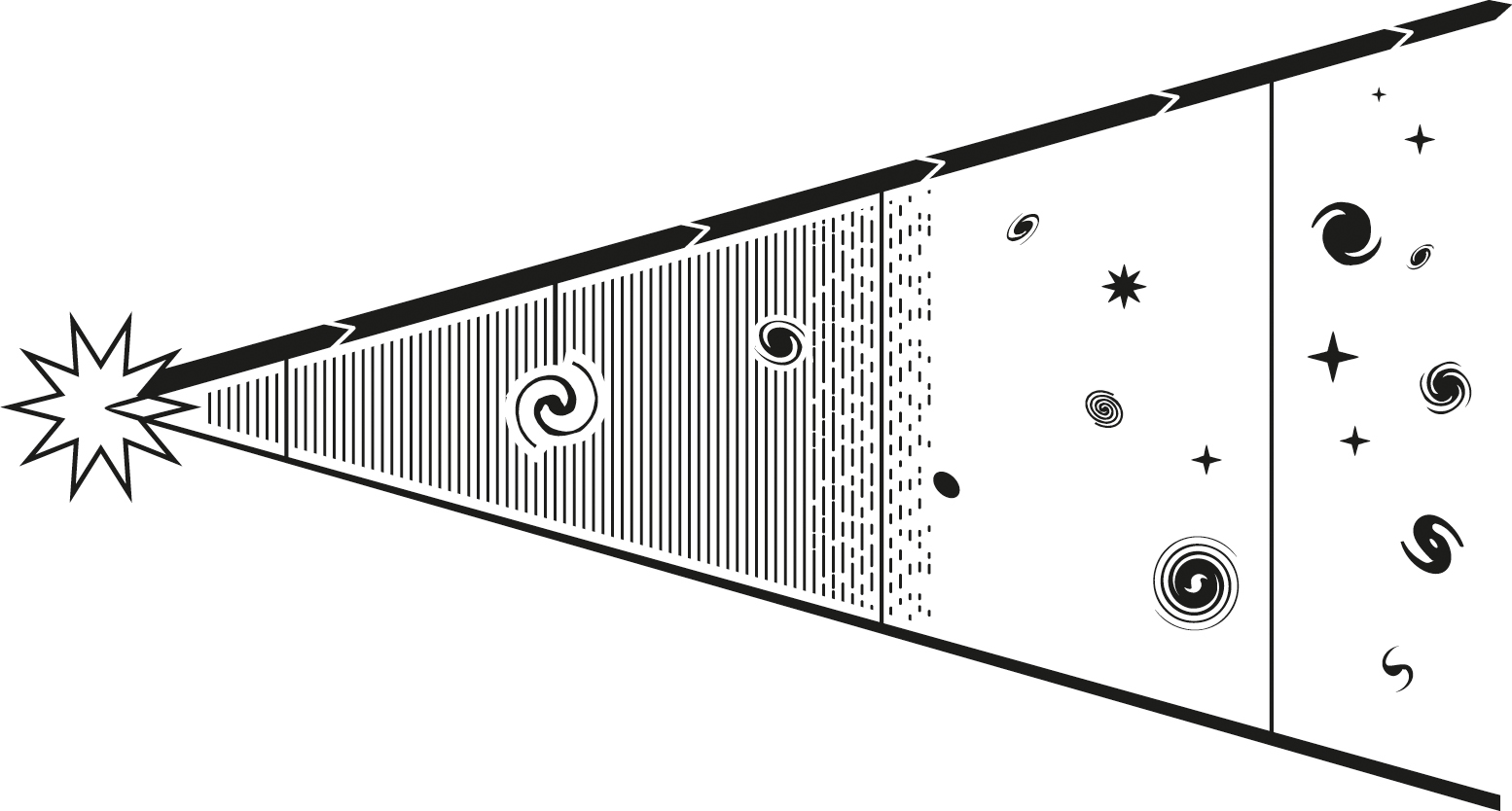
In the Big Bang, a soup of fundamental particles condensed into the matter that we see today, and dark matter that hides from us. After a period of darkness, stars and galaxies emerged into the Cosmic Dawn.
The dramatic birth of the Universe was a small, dense, hot explosion, the fireball of which is still visible as radiation everywhere. Galaxies condensed out of the outrushing material, a phenomenon that we see as the expansion of the Universe. Somewhere in that event and that material lie our own origins.
There is a simple fact that justifies the analogy between the history of the Universe and a human life, which ages after starting at birth: it is dark at night. In daytime, when we look up, our line of sight goes up to the sky. It may zoom straight out into space, but it may reach an air molecule and its direction may then be changed. The line of sight might end up on the Suns surface it forms a route via the sky that links our eye and the Sun. As a result, the sky is bright. At night, our line of sight may also zoom directly into space; again, it may reach air molecules and be diverted, but the molecules will not be illuminated by sunlight. The line of sight will not then turn towards the Sun, but will extend out into space to end up somewhere far away in the Universe. Sometimes it will end up on the surface of a galaxy or star, but mostly it heads into nothing and, as a result, the night sky is dark.
If the Universe was infinite in extent and fully populated with stars, the line of sight would always end up on a star. If you stand in a large forest, surrounded by trees, no matter in which direction you look, eventually your line of sight ends up on a tree trunk. Likewise, in an infinite Universe populated by stars, your sight-line would always end up on the surface of a star and the night sky would be as bright as the surface of the Sun. Manifestly this is not so.
This contradiction is known as Olbers paradox, after the early nineteenth-century German astronomer Heinrich Wilhelm Olbers ( 17581840 ), who was not only a prominent doctor in Bremen, but also a keen amateur astronomer. As a student, he studied both medicine and mathematics, and it was said that he developed a new way to calculate the orbits of comets while sitting at the bedside of a sick patient. He installed a telescope in an upper room of his house, from which he observed comets. He survived on only four hours sleep at night and was thus able to pursue two careers: a busy professional life as a doctor and his passion as an astronomer. He has been called the greatest of amateur astronomers (and his work as a doctor seems to have been respected, too).
Bremen is a port in northwest Germany between Denmark and the Netherlands, near to the North Sea. Its climate is not ideal for astronomy, and it might have been while he waited for the clouds to clear that Olbers wrote an influential article in 1823 , still important and the subject of much discussion in modern times, on the paradox of why the night sky is dark. His article brought attention to the paradox, although the question has a much older history, with a number of distinguished scientists having discussed it before him. Its importance as a help in appreciating the birth of the Universe was not rediscovered until 1960 .
Next pageFont size:
Interval:
Bookmark:
Similar books «The Universe: A Biography»
Look at similar books to The Universe: A Biography. We have selected literature similar in name and meaning in the hope of providing readers with more options to find new, interesting, not yet read works.
Discussion, reviews of the book The Universe: A Biography and just readers' own opinions. Leave your comments, write what you think about the work, its meaning or the main characters. Specify what exactly you liked and what you didn't like, and why you think so.

